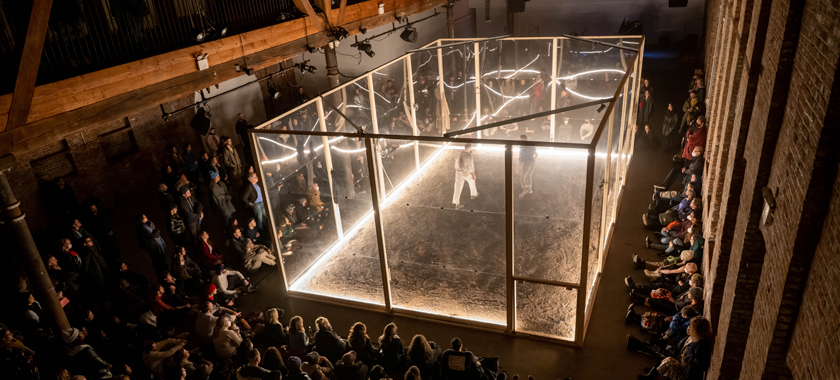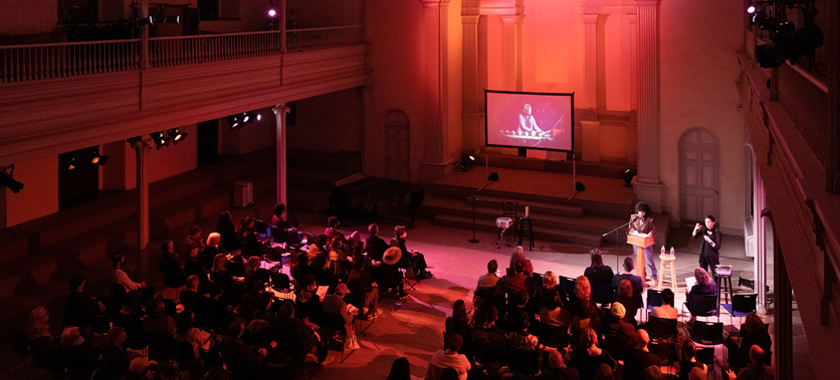
Dedicated Support for Artists: Conversation with Kay Takeda – PART II
Kay Takeda, Executive Director of Foundation for Contemporary Arts (FCA), shares opportunities, resources, and advice for the immigrant artist community.
Kay Takeda talks about what drew her to Foundation for Contemporary Arts (FCA), and shares tips for artists on writing an artist statement, project narrative, and project budget in the second of two interviews. Read Part I here.
NYFA: Please talk about your vision as the Executive Director of FCA. What opportunities can the immigrant artist community benefit from now and in the future?
Kay Takeda (KT): What drew me to FCA is how it goes about its work. In 1963, Jasper Johns and John Cage had the idea to organize an exhibition of donated work to raise funds to support Merce Cunningham and other performing artists. They recognized that visual artists could sell their work to help their peers working in performance. Eventually FCA was formalized as a foundation led by artists, for artists, and it grew carefully and steadily over decades.
We continue to hold benefit exhibitions to support our grant programs and to date over 1,000 visual artists have contributed artworks to support their peers. Along the way, like-minded individual donors and institutions followed suit; artists and friends have moved the organization forward all these years. It feels very much like the group effort of a growing artist community over many years.
It is striking to me how the issues FCA was formed to address are still pressing, and call on us to reach out and invite in a more expansive range of perspectives—to expand our community, our thinking on experimentality, and on what an artist-centered organization can and should be. Solidarity and mutual support among artists is more important than ever. I am interested in how responsive we can be to artists’ ideas about shifting the paradigms of support.
At present, I would recommend the artists consider our Emergency Grants program and look at our social media feed for examples of the kinds of experimental projects we support.

NYFA: Based on your experience reviewing grant applications and participating in grant panels, what advice would you give to immigrant artists in terms of writing narratives and artist statements? Any tips when it comes to putting together a budget for an application?
KT: That’s a big question! Pulling out just a few core recommendations, I would first say, before you write anything, talk to others about the guidelines and criteria for the grant program and your questions in particular. Some funders reach outward and make time to explain these things, others may not. Some applications can feel coded in their language—so it can really help to talk it through with someone familiar with the resource.
I would describe an artist statement as an opportunity to set the artistic context for oneself and one’s work, to communicate what a bio and a resume cannot. It is the place for the artist to share their interests and approach to the work; the underlying concepts, methods, materials used; and any new developments or evolution in their artistic concerns. I would suggest artists reading their statement while viewing the work samples they plan to submit and consider if they reflect and support each other. This is another area in which asking a friend to take a look and share their feedback is valuable. Much of the challenge in grant writing is to step outside of your own thinking to hear what someone else receives in reading it.
When it comes to writing a project narrative, I always say be clear and concrete; it can help to think journalistically—set the stage, tell the story. Provide details that anchor ideas in reality: the Who, What, When, Where, Why, and How. How many artists are involved, How long the project will run, etc. If the reviewer can clearly imagine the project, you are most of the way there. This is where a well-considered budget, personnel information, and marketing/communications plans can be important. Finally, be sure to answer the questions you are asked, and don’t take my general advice here over any specific guidance you may receive from the funder.
When it comes to the financial request, I’ll share two thoughts: artists should ask for what they need with the knowledge that grants are rarely awarded for the full amount requested. Asking for less than you need will put you at a disadvantage, even if you are funded. A fairly common misconception is that the smaller the request the more likely it is to be funded. These things are not connected; generally, funders decide to support a project based on how valuable they think the project or work is. The size of the ask is really only relevant later, once the decision to fund has been made. In terms of actual budgeting tips, I probably have too many to include here, but I recommend reading an article I wrote on the topic for the Creative Independent a few years ago; it is still the clearest and most concise expression of my recommendations.
I have also worked with the wonderful team at Creative Study* to develop two videos on budgeting that are available on their platform; from time to time I do live Q&As for their audience. They have a great set of videos for artists on financial health and on many other professional topics.
*Fiscally Sponsored by NYFA
About Kay Takeda
Kay Takeda is the Executive Director of the artist-founded and artist-led Foundation for Contemporary Arts (FCA), which celebrates its 60th anniversary this year. FCA recognizes artists making innovative work through unrestricted grants and project support for urgent needs and opportunities. In her previous role as Deputy Director of Artist Programs at the Joan Mitchell Foundation, she oversaw a diverse roster of artist-centered initiatives, including its grants, residencies, and professional development programs. As Vice President of Grants and Services at Lower Manhattan Cultural Council, she developed and expanded the organization’s grantmaking and professional development programs and launched new community initiatives. She has led national grantmaking programs at Arts International and managed exhibitions and programming at the Newhouse Center for Contemporary Art, Snug Harbor. She serves on the board of Movement Research and lectures widely on professional issues affecting artists.
–Ya Yun Teng, Program Officer, Immigrant Artist Resource Center (NYC)
This post is part of the ConEdison Immigrant Artist Program Newsletter #159. Subscribe to this free monthly e-mail for artist’s features, opportunities, and events. Learn more about NYFA Immigrant Artist Mentoring Program.